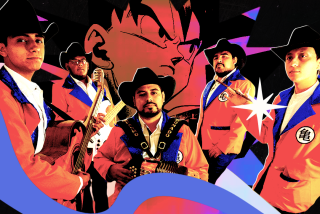Deftones’ ‘Koi No Yokan’ makes it to the Hollywood Palladium
Words don’t mean a lot to Chino Moreno. For the singer and lyricist from the ethereal metal band Deftones, songs are all about melody and the venting of pure emotion, not poetry.
“I really don’t think too much about writing lyrics. I’m not like a poet,” says Moreno, calling from a Deftones tour stop in Argentina. “It’s all pretty much how I feel about the sound of the music. Melody always comes first, and the words will just come. It’s sort of a puzzle to put together.”
Even his fellow band members aren’t sure what he’s singing about, although the emotional stakes seem clear. From the opening moments of the band’s new album, “Koi No Yokan,” heavy guitars and beats keep an uneasy balance with Moreno’s wailing of intense agony and euphoria, his words evocative and mysterious: “She breaks horses / With strange distant voices . . .”
The song is “Swerve City,” and it recaptures the distinctive layers of sound the quintet began perfecting with 2000’s “White Pony” album, a creative breakthrough for the band. Deftones will deliver that sound Wednesday night at the Hollywood Palladium.
“When you’re making records, you never go in with a preconceived idea what it’s going to sound like,” says Moreno, 39. “But the one thing we keep in the back of our mind is that we want to make a dynamic record -- where it’s not just what you hear in the first 20 seconds of a song. Those dynamics keep it interesting for us.”
As with 2010’s “Diamond Eyes,” the new album represents continued inspiration after a period of discord within the band. Some of the angst was washed away in reaction to the absence of bassist Chi Cheng, still recovering in a partially conscious state from a devastating 2008 car accident. The Deftones players also discovered that they still like collaborating, years after first making music together as Sacramento teens at the very end of the ‘80s.
“We really felt invigorated with the last record -- the energy level, and everybody in the band was getting along really well,” says Moreno. “We got off touring that cycle, which was about a year and a half long, and as soon as we got home, we pretty much went right into rehearsals. Everybody was very eager to get back in and start writing again.”
The band -- Moreno, guitarist Stephen Carpenter, drummer Abe Cunningham, DJ-keyboardist Frank Delgado and bassist Sergio Vega -- secured a small rehearsal space in North Hollywood and got to work. “A little, tiny room,” Moreno describes it, “and we just started writing. In a couple of months, we had a bunch of material, and we were just psyched. We went back in the studio and started tracking.”
The album’s 11 tracks were produced by Nick Raskulinecz, known for his work with Alice in Chains, Foo Fighters and on Deftones’ “Diamond Eyes.” Moreno acknowledges that “Koi No Yokan” is “not our heaviest record,” but he has faith that fans will embrace it as before. The first song released from the album was “Leathers,” which unfolds with 40 seconds of delicate ambient sound before erupting with rage and drama from Moreno and the band.
“It may be heavy in emotional ways, but I don’t think it’s as metal a record as some of our previous work,” Moreno said. “A lot of people like us for different reasons. There’s fans that don’t like our first record. There’s fans that love us for that record and nothing else after it. There are fans that only like ‘White Pony.’ ”
“White Pony” was a turning point in many ways, winning over critics, garnering a Grammy for best metal performance and wracking up platinum sales in the U.S. The album was a break from that era’s pervasive “nu metal” mix of hip-hop vocals and grinding guitars, best represented for good or ill by Limp Bizkit. Moreno doesn’t rap, but some friends and associates thought he should.
“We tried to go in our own direction. That was against advice from the label, from a lot of our people. I remember when they were first hearing parts of the ‘White Pony’ record, they wanted me to rap,” he says. “That sound was pretty much played out at that point. Not that I didn’t like it or that I thought we were better. I understood, but at the same time I always wanted to experiment. That’s what we did, and I think we made the wise choice. We did lose a lot of people with that record, but we gained a lot of other people.”
When he’s off the road, Moreno works to live as normal a life as possible, driving his kids to school in Los Angeles in the morning. “A vacation to me is being at home,” he says. But Moreno also knows that he and the band will inevitably return to the studio, looking to not repeat what they’ve done before.
“That’s just boring,” he says. “That’s one thing that’s kept us going: We feel we can make a left turn when we want. It might not work and that’s fine. At least we try it.”
More to Read
The biggest entertainment stories
Get our big stories about Hollywood, film, television, music, arts, culture and more right in your inbox as soon as they publish.
You may occasionally receive promotional content from the Los Angeles Times.







